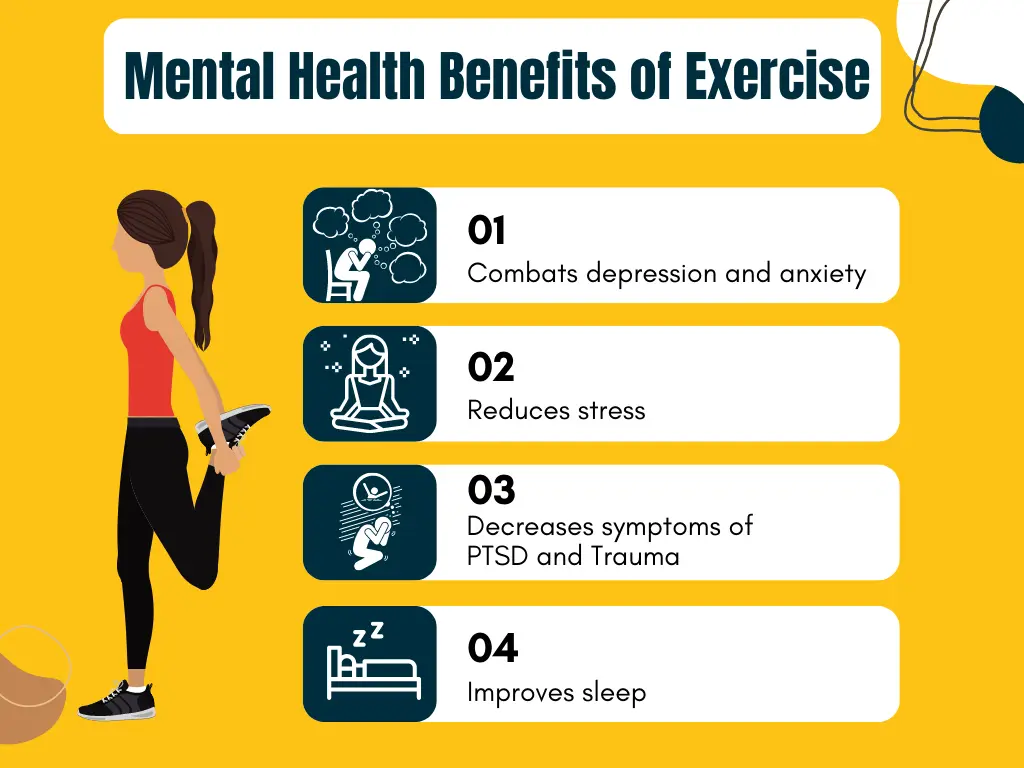We have different reasons to exercise, like losing weight or staying healthy and fit. But apart from these, there are potential mental health benefits that make exercise a powerful drug to relieve depression and anxiety.
Exercise is widely known for its physical health benefits, but its mental health benefits are just as significant. With growing awareness around mental health, understanding how exercise can positively impact psychological well-being is essential. This article dives into the mental health benefits of exercise, offering insights for anyone interested in using physical activity as a natural way to enhance emotional and psychological resilience.
Increases Happiness
The mental health benefit of exercise is that it helps in releasing “happy chemicals” called endorphins, similar to pain medicine but it can interact with your neurotransmitters.
These endorphins are naturally released by exercising regularly because it can reduce depression and increase or boost happiness.
Reduces Stress
The main ability to reduce physical and mental stress is to exercise. Hitting a gym or working out at home can have a robust release of the stress chemicals that can help the brain with moderate stress.
Also, putting your body under physical stress on a regular basis teaches your body how to recover and adapt to stress both mentally and physically.

The Psychological Benefits of Exercise
While most of us are familiar with the physical perks of staying active like better heart health and weight control the psychological benefits of exercise are just as important. Whether you’re looking to clear your head, manage stress, or even sharpen your memory, exercise can offer a wide range of mental rewards.
Here are five major psychological benefits of exercise:
1. Help for Depression and Anxiety
If you’re feeling down or anxious, exercise can be a powerful mood booster. Physical activity triggers the release of endorphins, also known as the “feel-good” chemicals in the brain. These natural mood lifters help combat symptoms of depression and anxiety. In fact, some studies suggest that exercise can be as effective as medication for certain people with mild to moderate depression.
- Endorphin boost: These chemicals create a sense of well-being and happiness.
- Natural treatment: Many doctors recommend exercise as a first line of treatment for anxiety and depression before considering medication.
Even 30 minutes of moderate activity a few times a week can make a difference.
2. Decreased Stress Levels
Another mental health benefit of exercise is its ability to reduce stress. When your heart rate increases during physical activity, it encourages the production of neurohormones like norepinephrine. These hormones improve your ability to manage stress by boosting mood and sharpening cognitive functions.
Exercise also encourages the body’s nervous systems, the central and sympathetic systems to work together more efficiently. This improved coordination enhances the body’s ability to respond to stressful events.
- Reverses stress damage: Exercise repairs brain damage caused by chronic stress.
- Improves emotional resilience: It makes it easier to manage stressful situations without feeling overwhelmed.
3. Increased Self-Esteem and Confidence
There’s no denying the physical changes that come with regular exercise whether it’s improving endurance, losing weight, or increasing muscle tone. However, these physical accomplishments also lead to a significant mental reward: a boost in self-esteem.
As you meet your fitness goals, you naturally feel more confident. Whether it’s fitting into smaller clothes or running faster than before, these victories build self-confidence and improve body image.
- Body and mind boost: Seeing improvements in your strength and stamina boosts mental health and body positivity.
- Sense of accomplishment: Achieving fitness goals, no matter how small, leads to greater self-confidence.
4. Better Sleep
If you’re having trouble falling asleep or staying asleep, exercise may be the solution. Engaging in physical activity increases body temperature, which can help you relax and fall asleep more easily. Additionally, exercise helps regulate your circadian rhythm, the body’s internal clock that signals when it’s time to sleep and wake up.
- Improves sleep quality: Physical activity promotes deeper, more restful sleep.
- Reduces sleep disruptions: By lowering stress and anxiety levels, exercise makes it easier to enjoy uninterrupted sleep.
Just be sure to avoid exercising too close to bedtime, as this can make it harder to fall asleep.
5. Brain Boost
Exercise doesn’t just benefit your body it also gives your brain a workout. Cardiovascular exercise, like running or cycling, increases blood flow to the brain, helping to stimulate the growth of new brain cells (a process called neurogenesis). This boosts brainpower, enhancing memory and cognitive function.
- Supports memory and learning: Physical activity strengthens the hippocampus, which is crucial for memory.
- Increases creativity: Studies show that exercise enhances creative thinking and problem-solving skills.
If you’re feeling mentally blocked or uninspired, a short walk or jog can provide a mental refresh, helping you think more clearly.

Provides More Energy
Our blood flow gets increased adding mental health benefits of exercise which in further helps carry oxygen and other nutrients to the muscles making it more alert and energized. People who do workouts regularly are generally more productive in their personal and professional life.
This increases their positive speech with a great effect on the perception of feeling awake and energized. It also helps them to focus more on healthy nutritional choices and avoid unhealthy food habits at the same time.
What Are the Mental Health Benefits of Exercise?
Exercise isn’t just about losing weight or toning muscles it has significant mental health benefits too. Whether it’s reducing anxiety or boosting your self-esteem, regular physical activity can improve your overall well-being in ways you might not expect. Let’s explore the various mental health benefits of exercise and how even small efforts can lead to major improvements in mood and mental clarity.
The connection between physical activity and mental health is backed by substantial research. Exercise triggers the release of chemicals in the brain that help improve mood, reduce stress, and foster a sense of well-being. Whether it’s a brisk walk, yoga, or strength training, every form of exercise offers mental health benefits.
Here are the key mental health benefits of exercise:
1. Reduces Symptoms of Depression and Anxiety
Exercise stimulates the production of endorphins, often referred to as the “feel-good” hormones. These endorphins interact with the receptors in your brain that reduce the perception of pain, promoting a positive feeling similar to that of morphine. In addition, physical activity decreases the levels of stress hormones such as cortisol, helping reduce symptoms of anxiety.
- Exercise as an Antidepressant: Regular physical activity has been shown to reduce symptoms of depression, making it a natural and effective alternative or complement to medication.
- Anxiety Relief: Simple exercises like deep breathing, walking, or yoga can immediately lower anxiety levels by providing distraction and releasing muscle tension.
2. Improves Mood and Boosts Self-Esteem
Exercise is a powerful mood booster. Physical activity stimulates the release of serotonin and dopamine, neurotransmitters that enhance feelings of happiness and satisfaction. Even short bursts of exercise can elevate mood and create a sense of accomplishment.
- Mood Enhancement: Just 20-30 minutes of moderate physical activity can improve your mood and leave you feeling energized.
- Boost in Confidence: As you meet fitness goals and see progress, your self-esteem and body image improve, making you feel more confident in yourself.
3. Enhances Cognitive Function and Memory
Exercise increases blood flow to the brain, promoting neuroplasticity, which helps form new neural connections. This improves memory, learning capabilities, and cognitive function. Regular physical activity has been shown to reduce the risk of cognitive decline as we age.
- Sharpens Thinking: Physical activity enhances concentration and helps with problem-solving and decision-making.
- Prevents Cognitive Decline: Exercise plays a key role in keeping the brain healthy, reducing the risk of dementia and Alzheimer’s disease.
4. Helps Manage Stress
Stress can take a toll on both the body and the mind. Exercise helps the body manage stress by releasing endorphins and reducing levels of stress hormones. Physical activity also acts as a meditation in motion, as focusing on your body’s movements can help you break the cycle of anxious thoughts.
- Physical Release: Exercise helps you release the pent-up energy that stress creates, leaving you feeling more relaxed.
- Improved Coping Skills: Physical activity teaches you how to handle stressful situations more calmly, helping to reduce overreactions to daily pressures.
5. Improves Sleep Quality
Struggling with sleep? Regular exercise can help regulate your sleep patterns by balancing your circadian rhythm. Engaging in physical activity helps tire your body naturally, leading to deeper and more restorative sleep.
- Faster Sleep Onset: Exercise reduces the time it takes to fall asleep, helping you get to sleep quicker.
- Better Sleep Quality: People who exercise regularly experience deeper sleep, which is essential for mental rejuvenation and recovery.
Develop and Strengthen Personal Relationships
The wonderful mental health benefits of exercise are to find quality time to spend more together with your loved ones such as a friend or a partner and keep each other motivated. In addition to this, people will seek out others who have the same interests.
This can develop and strengthen interpersonal relationships with a great deal of impact on mental health and also helps in succeeding in your goals.
Our experts at Skale Fitness will help you develop all the above-mentioned mental health benefits of exercise with a mindfulness practice where you can see significant changes over time. You can also build a heightened awareness of your automatic thoughts, refocus attention, and disrupt negative thought patterns.
Conclusion
Participating in standard active work might deliver enhancements in a person’s actual wellbeing, mental execution, and mental prosperity. Actual advantages incorporate, however are not restricted to, diminished risk for sicknesses, and enhancements in actual working, wellness, and in general personal satisfaction.Let’s join Skale Fitness and have a peaceful mind.
Read Also: Weight Loss Tips for Women, Benefits of Push-Ups for Women




